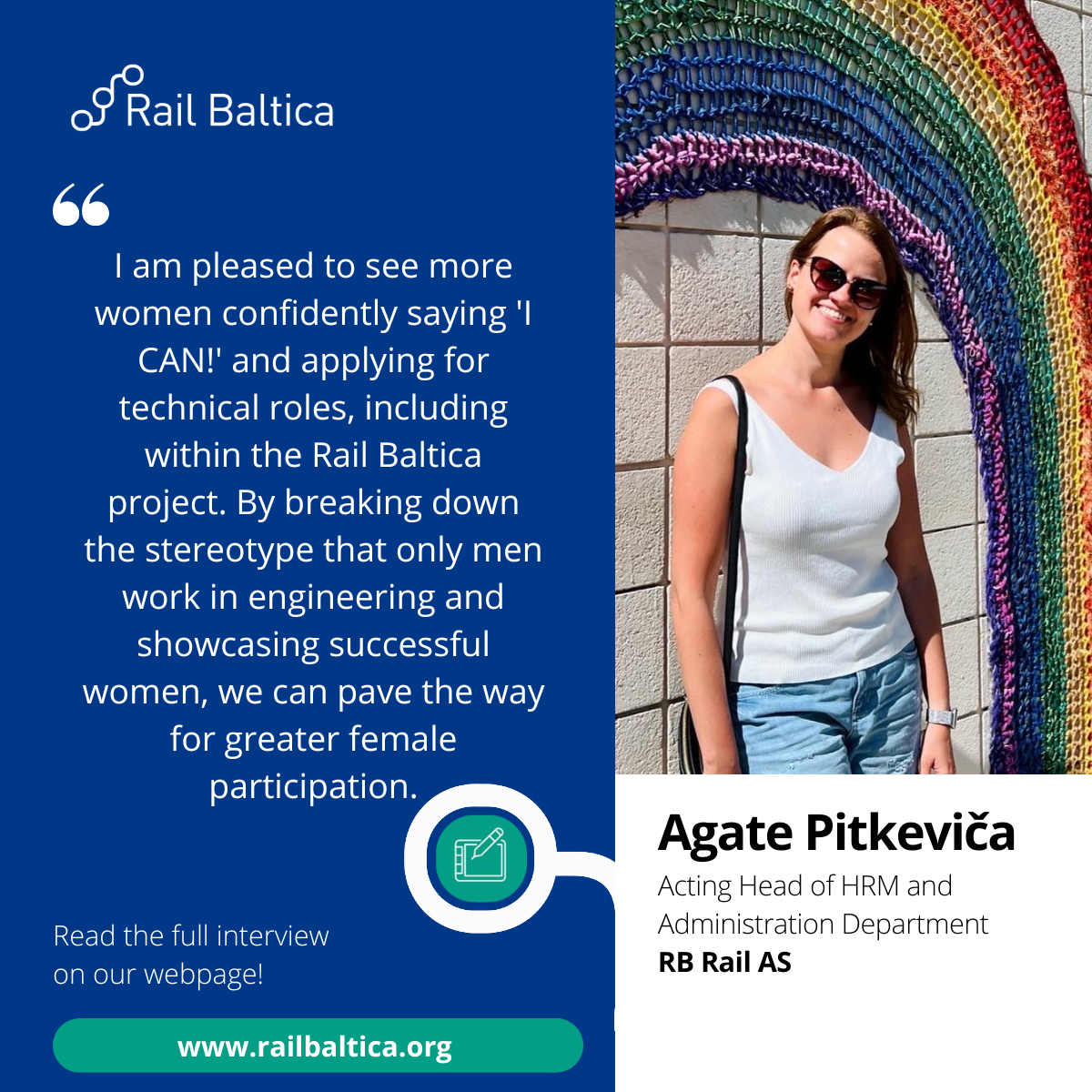Rail Baltica is a railway infrastructure megaproject that spans across several countries. The depth of skills and expertise required to successfully execute a greenfield project of this caliber is extensive and would not be possible without our diverse team of professionals.
Welcome back to our series, “Rail Baltica: The People Behind the Vision,” where we introduce you to the members of the Rail Baltica global project team. These individuals are the driving force advancing the Rail Baltica project with their professionalism, dedication, and passion for this project.
 Agate Pitkeviča, Acting Head of Human Resource Management and Administration Department, RB Rail AS
Agate Pitkeviča, Acting Head of Human Resource Management and Administration Department, RB Rail AS
When did you join the Rail Baltica project and what inspired you to become a part of the team?
I joined Rail Baltica in February 2020, just before the Covid-19 lockdown. It’s been already over 4 years now, though it feels more like ten! I was drawn to the project by its large scale and the captivating idea behind it.
How has your role evolved since you first joined the Rail Baltica project, and what have you learned along the way?
Since joining the project, my role has undergone significant evolution. Throughout the years in Human Resource Management (HRM) team we have delved deeply into core HRM functions such as Recruitment and Selection, Onboarding and Offboarding, Learning & Development, Talent management, People Analytics, etc. Also, during these years we have tried to break the stereotype of HR as unapproachable and only concerned with problems. I take pride in the fact that colleagues now come to us not just with issues but also for advice, brainstorming sessions, or simply to share their thoughts and feelings. And that says a lot about HRM function in an organization.
What hobbies, interests, talents do you have?
Two years ago, I made the only New Year’s resolution I have ever made – to find and pursue a new hobby. And I succeeded! In addition to my love for mountains, travel, and hiking, I’ve developed a passion for knitting (which I’ve become quite obsessed with) and bouldering (aka rock climbing)!
In your career, what is the biggest challenge you have had to overcome?
For me, the biggest challenge has been throwing myself out of my comfort zone. Initially, stepping beyond what felt familiar was uncomfortable, but over the years, I’ve come to realize that growth comes from pushing those boundaries. Embracing discomfort has become a key strategy for learning and development in my career journey, and it has proven to be effective!
Who inspired you during your career and why?
There have been many inspiring individuals throughout my career journey. Whether they were former managers, colleagues, or even individuals from different teams whom I rarely interacted with, each has left a mark. However, one person stands out above all – my brother Ģirts. He not only taught me the English language after school but also recommended the field of study when I was unsure about my path after high school. Somehow, he has always been the person I look up to, encouraging me not to break at the first sign of challenge or problem but just keep pushing forward. He has always given me the assurance that I am doing well and that I can do more.
Did you know you wanted to be a human resources professional from a young age?
I can’t claim that HR was always my dream profession since childhood. Like many girls my age, I initially aspired to become an actress or singer (the “Spice Girls” were my absolute favourite band back then!). At the same time, it is not an accident that I found myself in HR. Empathy has always been a strong characteristic of mine, and during my Law studies, I was particularly drawn to employment matters, alongside Criminal Law, of course!
What do you see as the challenges to attracting more women into rail and what do you think could be done to make a difference?
I believe one of the main challenges lies in the stereotype that only men work in the engineering industry, especially in railways, and that only they can excel in such roles. However, I’ve observed a positive shift: women are becoming increasingly self-assured, believing in themselves more, and asserting “I CAN!”. I’m thrilled to see more women expressing interest in the railways and applying for technical roles, including those within the Rail Baltica project.
Breaking down these stereotypes and promoting gender diversity through awareness campaigns and highlighting successful women in the industry can help pave the way for greater female participation.
